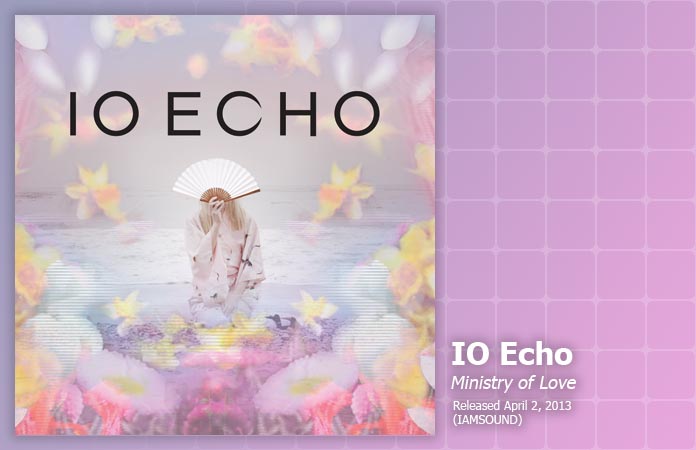Music Review: IO Echo, Ministry Of Love
Published on April 18th, 2013 in: Current Faves, Feminism, Music, Music Reviews, Reviews |
There are albums so good, the task of describing them seems overwhelming. Yet the glorious challenge of explaining why the songs are amazing can be a real honor, especially if even one person reads my paltry words, buys the album, and is thus transported.
So it is with Ministry of Love, the debut album from the duo of Ioanna Gika and Leopold Ross, who form IO Echo. They marry the proto-goth of early Cure and Siouxsie with the lushness of Cocteau Twins and School of Seven Bells in songs informed by the subtle yet strong undercurrents of Asian sonics. Despite what my descriptions might imply, Ministry of Love isn’t bleak. The euphoric pop of songs like the title track and “Ecstasy Ghost” ensure that the album never feels morose, although it skirts the edges of unsettling.
Ioanna’s deadpan, at times flat, vocals might seem to contrast with the richness of the music upon first listen, but they belie the depth of the emotions she conveys. Her ingenious and inventive use of lyrical scan relies more on the feelings the sounds conjure than the words themselves. Although her voice registers mostly as fragile, she can summon strength when needed, thus ensuring that the music isn’t overshadowed by her vocals, but elevated instead.
The songwriting on Ministry of Love is exquisite. It tackles both sexual and spiritual politics as well as the kind not preceded by adjectives. The personal becomes the political and vice versa. Lyrics address modern concerns like “plastic doors and plastic keys” (“When The Lilies Die”) and ancient or just old-fashioned ones, such as the Emily Dickinson-esque “one love from carriage to hearse” (the S.E. Hinton-inspired “Outsiders”). There are many references to flowers (like the song “Forget Me Not”) but the imagery they evoke resonates on a deeper level.
For example, in “When The Lilies Die,” the various, contradictory interpretations of the titular flower are presented—the ancient Greek symbol of sexuality and the more modern Christian symbol of chastity—while references to Paradise add to the specter of religious iconography. The gorgeous vocal textures in “Eye Father” are imbued with the religious symbolism of flowers such as the iris (sorrows which pierced the heart of Mary), the mourning Cypress, “god made flesh” in the carnation, such as the pink ones said to have sprung from Mary’s tears, an emblem of undying love. The sensations described in “Ecstasy Ghost” are of a spiritual, not sexual, nature.
Conversely, the woozy, bruised “Stalemate” opens with a chilling verse, like the victim of abuse with Stockholm Syndrome: Thick/fingers around my neck are grasping in/waiting for the moment to slide in/have a drink and let this game begin.
Themes of uncertainty and duality are present in other songs as well. Fluid sexuality is brilliantly described in “Drag Love”: Perfume/A smoke for you to pass through before the neon hazes you/It blurs the pink into the blue. The sobering double entendres in “Addicted” ruminate on shooting and death, and equate addiction with the siren’s call: I think I’m free but the body song/it goes on and on and on and on.
“Berlin” dives into despair and the duplicity of self-deception while referencing the formerly divided city. The alternating sides of either embracing or revoking life are made manifest in the lyrical arrangement towards the end of the song. Lines like “In a moment soon I will hit the ground/And I know I’ll feel it/but your concrete calm is what speaks to me” will resonate deeply with those who understand suicidal feelings.
The most overtly political track is “Tiananmen Square.” Although the events in question took place in 1989, they’re as relevant as ever, considering the various political uprisings around the world and the fact that even discussing the events—from either a government or citizen perspective—is still banned by the Chinese government. The line “there are some monsters who think people exist” twists the protagonist to make a point, one that’s driven home further with “because being for something is harder than just being against.”
Ministry of Love heralds the arrival of a band to watch (and listen to) closely. It’s the very best kind of album, the kind that music fans pray for, one that gives you more the more you listen.
Ministry of Love was released on April 2 through IAMSOUND and is available on iTunes. Check out the IO Echo website, where you can stream tracks from the album.
3 Responses to “Music Review: IO Echo, Ministry Of Love”
April 18th, 2013 at 1:20 pm
I love how perfectly the Io Echo album art matches the Popshifter layout!
April 18th, 2013 at 2:00 pm
Pretty cool coincidence!
LLM
April 18th, 2013 at 9:00 pm
Clearly Popshifter’s love for it was meant to be. 😀
Time limit is exhausted. Please reload the CAPTCHA.